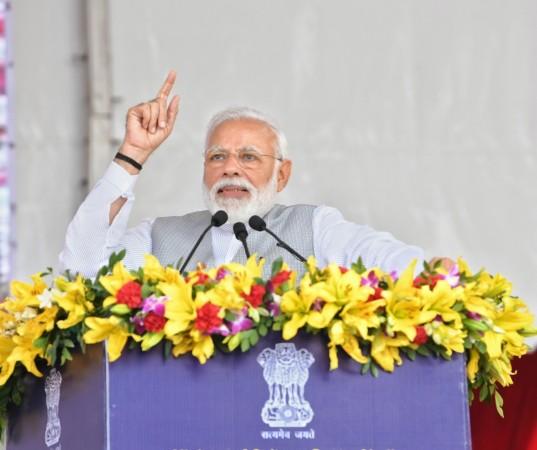
The bulls are on the rampage on the Street revved up by foreign buying and the brightening prospects of the return to power of Prime Minister Narendra Modi after the Balakot bomb run in retaliation to Pulwama attack. Sensex, the 30-scrip benchmark index of Bombay Stock Exchange (BSE) surged about 1,000 points in six sessions of March in what is seen as the beginning of a long rally to close on Tuesday at 37,535 points. The broader 50-index National Stock Exhange (NSE) Nifty clocked about 400 points to close at 11,301 points.
Indian rupee touched a new 2-month high on the back of strong foreign buying of both debt and equity. Market observers see renewed risk appetite in foreign institutional investors (FII), who have poured in about Rs 8,000 crores so far this month, according to a report in the MoneyControl website. FIIs sustained net inflows in February and January pumping in Rs 13,564 crores and Rs 127 crores respectively. Foreign portfolio investors (FPI) have also been supporting net inflows having brought in a net amount of Rs 11,182 crores last month.
Market watchers are confident of a continued bull run this time unless there is a disastrous political turn as the rally has been broad based with strong movement in all sectors. The Nifty Bank index on Tuesday surpassed its all-time closing high of 28,320 hit on August 9, 2018, to hit a high of 28,363 in the intra-day trade, the Business Standard website said. The most active stocks on NSE were Reliance Industries (RIL), ICICI Bank, Axis Bank, Titan Company and UPL hitting their high.
The bullish turn is attributed in part to the market euphoria over polls that have predicted a return of the Bharatiya Janata Party under Prime Minister Narendra Modi.
The mid-and small-caps have been gaining traction among the investors after having bled for more than a year. Experts are bullish on the segment because of their favourable valuation.

Chandresh Nigam, managing director and chief executive officer (CEO) of Axis Mutual Fund, had told Business Standard recently: "We have seen increased flows from HNIs in the mid- and small-cap schemes in the last four-five days. Sophisticated investors are taking tactical calls on the mid- and small-cap categories. There has been sustained correction in some of these categories. Some wealthy investors see this as a good time to deploy their funds."
The bulls have also found traction in the revised notes by foreign brokerages such as HSBC, BNP Paribas and Morgan Stanley on Indian equities. HSBC recently raised its weightage on India from 'neutral' to 'overweight' and remains bullish on financial, metal, and consumer discretionary sectors in the Indian context, according to a report.
"Aside from the elections, the macro backdrop is looking better in 2019 than in 2018. Inflation is low, and our economists are now looking for a rate cut in April. We expect overall GDP (gross domestic product) growth to accelerate, possibly supported by reforms (such as GST) starting to bear fruit," Herald van der Linde, head of equity strategy for the Asia Pacific at HSBC wrote in a note along with Devendra Joshi and Prerna Garg.
The global cues have also been conducive for the Indian bull run. The Asian shares have been upbeat after the European Commission's nod for changes to a Brexit deal ahead of a vote in the British parliament. European Commission head Jean-Claude Juncker agreed to additional assurances in an updated Brexit deal with British Prime Minister Theresa May on Monday, according to Reuters. The easing of trade war clouds between the US and China have also helped the global markets, reflecting the shine on Indian equities.

















